4 Keys To Running A Profitable Pastured Poultry Business
Farmers and ranchers do the work they do because they love the life it gives them—not for the money.
In fact, the 2017 USDA agricultural census found that only 43% of farms are profitable.
If you love to farm, but find it financially difficult, your day is about to get better.
Here at The Mobile Chicken House, we are passionate about enabling farmers to do what they love while adequately providing for their families.
That’s why we are going to go over the basic principles of running a profitable poultry farm and then back it up with actual steps toward achieving the principles.
Let’s get started!
The Principles of a Profitable Pastured Poultry Business
There are several baseline principles that must be in place in order for a poultry business to be profitable.
Let’s take a look at each of them
1 - Your Flock Must Be Healthy
Disease within your flock always leads to decreased profitability. Whether it's reduced performance in areas such as breeding, growth rate, feed conversion, or egg production you can rest assured that the bottom line of your business suffers.
It's a simple concept, and consistent with the rest of life, yet it tends to be underrated.
Many farmers neglect the health of their poultry in an attempt to save money, but in the end, this strategy backfires when their flock gets sick.
We encourage any poultry farmer to prioritize the health of their flock. If you want to take a deeper dive into chicken health, make sure to read our blog: How To Keep Your Chickens Healthy (and get amazing eggs).
We’ll also give some practical tips on this topic later in this article.
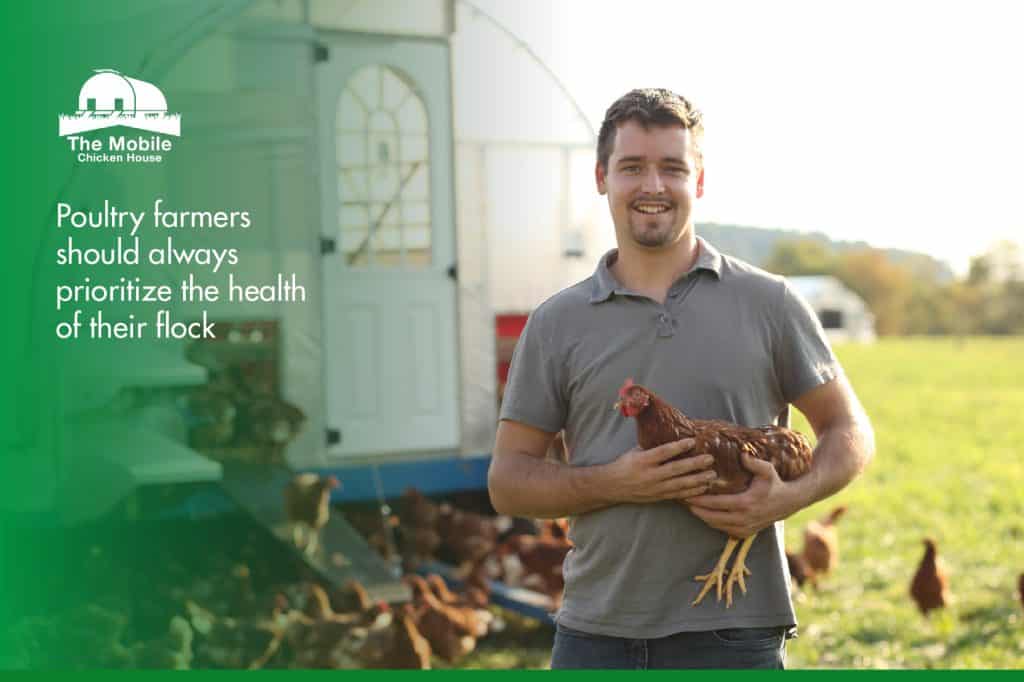
2 - You Need To Minimize Feed and other Expenses
Let’s continue our thought from the previous point of keeping your flock healthy. If you want to keep your flock of poultry healthy, it makes sense that you would give them a high-quality feed.
However, high-quality chicken feed costs money. For example, a non-GMO, organic chicken feed often costs around $30 for a 50-pound bag. Add to that a nutri-balancer or other supplement, and you’ll see your cost for feed rising quickly.
In other words:
Make sure you feed your poultry well, but ensure you aren’t overfeeding them, and work hard to find ways to increase the efficiency of your feed conversion. Otherwise, you’ll see your profits slipping away like sand!
(We’ll talk more about how you can actually do this a bit later).
3 - Reduce The Amount of Time Needed to Manage Your Flock
The old statement, “time is money,” is quite accurate.
Think about it: you may be selling your poultry products at a great price, but if you have to hire exorbitant amounts of outside help or spend hours managing your flock your profits remain low.
On the other hand, if you can cut down the amount of time it takes to manage your flock your profits spike.
It’s the same reason a dairy farmer might buy a robotic milker. One robotic milker that milks 50-70 cows costs between $150,00 and $200,000. While that’s a lot of money, the farmer understands that the time the robot saves them is well worth the cost in the long run.
So, make sure you spend time creatively thinking about and implementing ways to reduce the amount of labor it takes to manage your flock—and stay tuned for our tips on this that are yet to come.
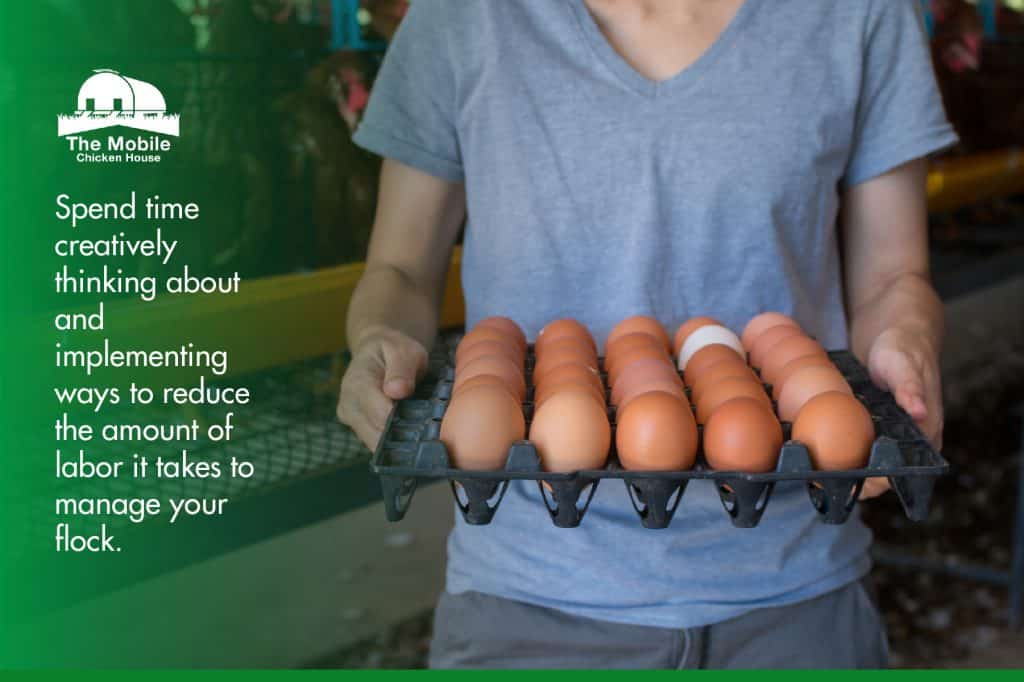
4 - Find The Right Marketing Channels
Suppose you get started on the right foot. You have a healthy flock, and you're keeping your expenses low by minimizing the amount of feed you use and reducing the labor it takes to run your operation.
You’re 90% of the way to success, but you haven’t arrived just yet.
You still need to make sure you can sell your eggs or meat at a good price. Unfortunately, if you don’t have the proper sales and marketing channels for your poultry business that won’t be possible.
Never dive headlong into the pastured poultry business without first securing reliable and profitable sales and marketing channels.
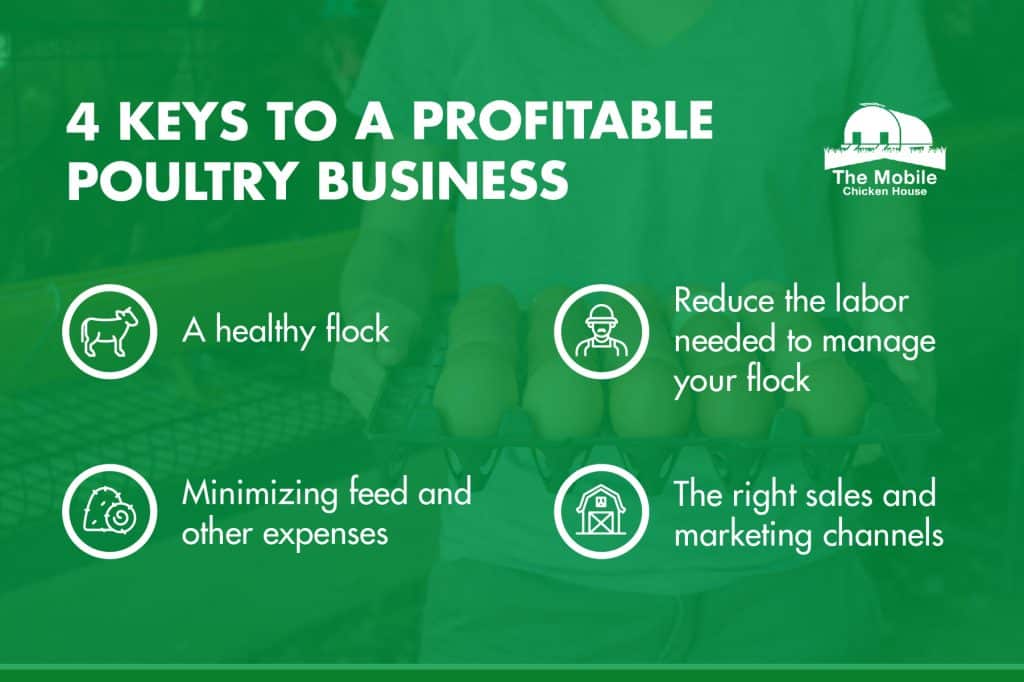
Implementing The Principles of a Profitable Poultry Business
Now that we understand the keys to running a profitable business, let’s talk about how you can make those principles actually happen.
How To Maintain The Health of Your Poultry Flock
Keeping chickens healthy isn't just about avoiding particular mistakes. It's about taking proactive action in crucial areas.
So, what should you be doing if you want healthy chickens?
It all boils down to one simple concept—creating the right environment where your chickens can thrive.
In particular, there are three factors that need careful attention when thinking about the environment a chicken will be living in.
- Air Quality
- Water Quality
- Feed Quality
1 - Air Quality
Who likes stinky, stale air?
Nobody, not even chickens.
In fact, chickens that don't have access to quality air are bound to be unhealthy chickens. Yet, many chicken coops contain unhealthy air.
For example, ammonia is found in the air of every single chicken house. Ammonia is naturally produced from chicken droppings, and if the concentration of ammonia in the air is too high, it becomes an extreme irritant to the hens.
Excess humidity also causes air quality problems. It promotes infectious respiratory diseases as well as bacterial and fungal growth.
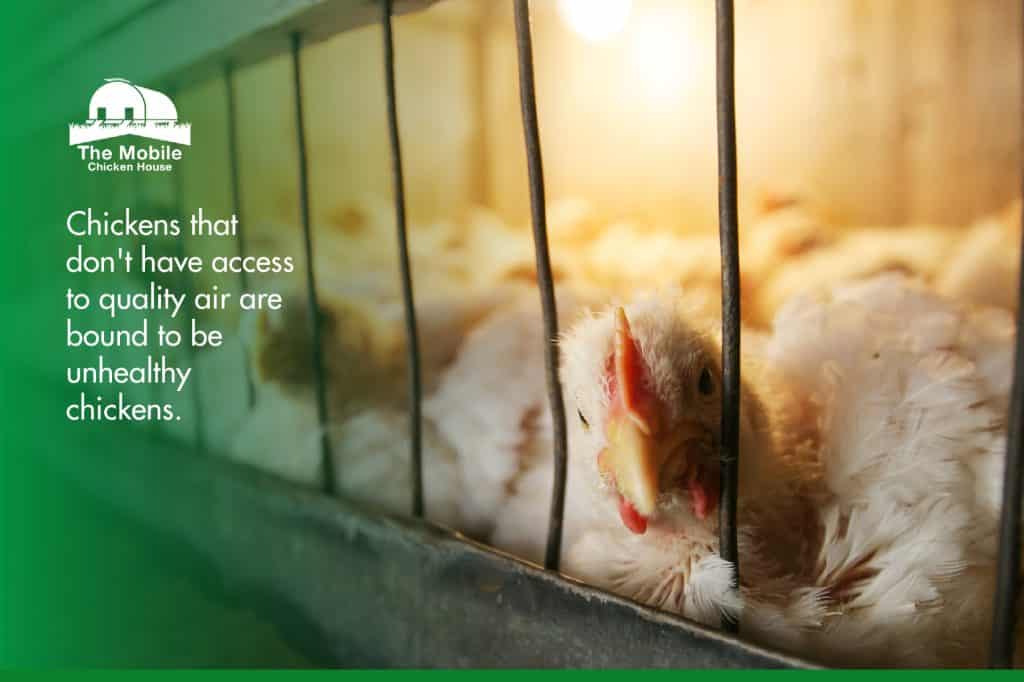
Sometimes chickens simply don't have enough oxygen in the air to breathe well. This comes from having a lot of chickens in small spaces without adequate airflow. The combination of chickens exhaling and manure composting significantly reduces the oxygen content in the room.
So what can you do to make sure your hens are getting quality air?
Here is a checklist:
- Replace bedding regularly! Doing so keeps bedding from getting wet. Wet bedding is often the cause of excess ammonia and humidity.
- Frequently remove manure.
- If your chickens are in an enclosed coop all day, replace the air 4-6 times daily. Since you don't want direct drafts on your hens, this is best done with a fan and vent.
- Purchase an ammonia detector or ammonia test strips.
The best way to ensure your poultry have access to good air is to allow them unlimited access to the outdoors with a mobile chicken house. Your best efforts to keep a clean chicken coop and replace the air just can’t compete with the freshness of Mother Nature.
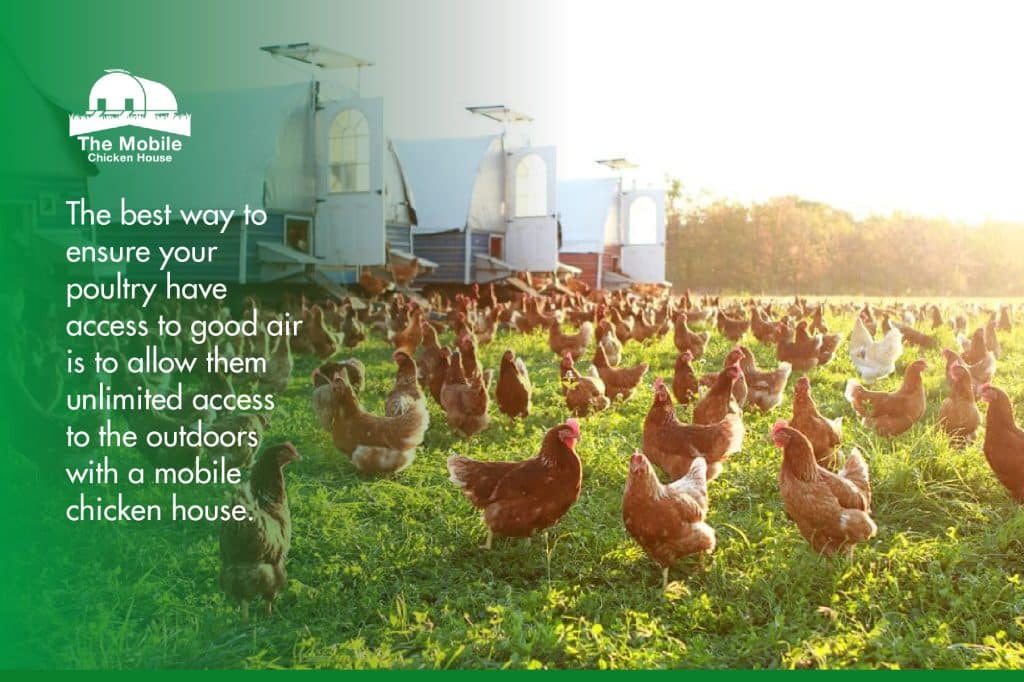
2 - Water Quality
Leonardo da Vinci is credited with saying, "Water is the driving force of all nature." It's true! We need it. Chickens need it. Everything needs water!
For chickens, good water plays a critical role in their health.
For example, water is an essential part of chickens digesting their food. Water in the crop (a pouch-like organ at the end of the esophagus that digests food) softens the feed so that digestion can occur. Without water, dry feed forms clumps in the crop that can press on the chicken's carotid artery.
Water is also an essential part of egg production. An egg consists of approximately 75% water, and without access to a regular, clean water supply, a hen will be physically unable to produce eggs.
So, what are the most important things to remember when giving water to your chickens?
- The water to feed ratio when the weather is reasonable (75-80 degrees) is 2:1. In other words, for every pound of feed a chicken is eating, it should be drinking 2 pounds of water. When the temperature increases, the chickens need even more water.
- Have enough space for at least 50% of the chickens to drink at the same time.
- Remember, chickens don't have tongues or lips, so they have to tilt their heads back to drink. To be more efficient, make sure the rim of your waterer is level with the average chicken's back.
- Make sure the water you are serving is clean, and replace it regularly. If you wouldn't drink it, it's probably not fit for your chicken to drink.
3 - Feed Quality
Have you ever experienced food poisoning? It's pure agony!
Luckily, it usually only lasts 24-48 hours, but when you have it, there's no doubt in your mind (or stomach) that you are quite sick.
In its purest form, food poisoning is just eating contaminated food. If you make a pattern of eating contaminated food, you will have more than just food poisoning—your health will continually spiral downward until you stop eating unhealthy food.
The same is true for any type of poultry.
It doesn't work to grab the cheapest feed off the shelf at your local animal or hardware store, throw it to your birds, and expect them to thrive.
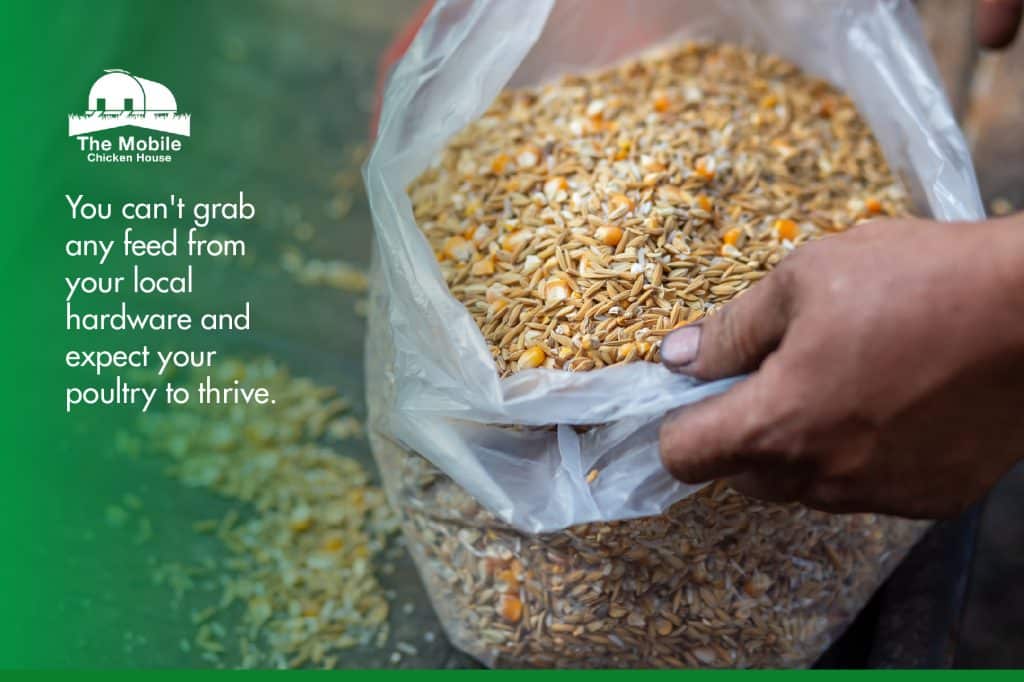
Rather, make sure you work with a small feed mill manufacturer that is willing to share exactly what goes into their feed. Then, keep these principles in mind to ensure your poultry get quality feed.
- Make sure the feed is fresh. Feed is best if used within 14 days of processing. Note that this means from when the feed was processed at the mill, not when you buy it. If 14 days feel impossible, that is ok, but try not to use feed that is over 30 days old.
- Get balanced feed for your poultry. Poultry need different kinds of feed, depending on their age and production level. Make sure you are getting a feed that meets your poultry's needs. If you have poultry that vary in age, you should buy different feeds to meet their needs.
- Ensure your feed is free of mold and toxins. Ask your feed manufacturer if they have a protocol or system for testing their products as they come in to ensure they are mold and toxin-free.
- Consider the texture of the feed. Again, consider your chickens when you choose the texture of your feed. Young chickens need a finer texture (not powder), and older chickens prefer a coarser texture of feed. For chicks, anything from an ⅛ inch to a ¼ inch particle size is ideal. Adult chickens can handle particle sizes up to ⅜ of an inch. Ideally, particles should be about the size of a grain of wheat.
- Check for grit in the feed. Grit is gravel that is included in your chicken's feed. Since chickens don't have teeth, they have to use a muscle called the gizzard to grind their feed. Including grit in your chicken's feed makes this process much easier for them and increases their gut health.
- The essential ingredients. A good feed should include: a type of cracked corn, a variation of a small grain like barley or wheat, and alfalfa meal. If you opt to go with soy in your feed, make sure to choose heat-processed soy instead of solvent extracted soy.
Admittedly, we’ve simplified the process of ensuring your poultry remain healthy. Any experienced farmer or rancher knows the effort and time that goes into this. However, ensuring your poultry have access to quality air, water, and feed is the best place to start.
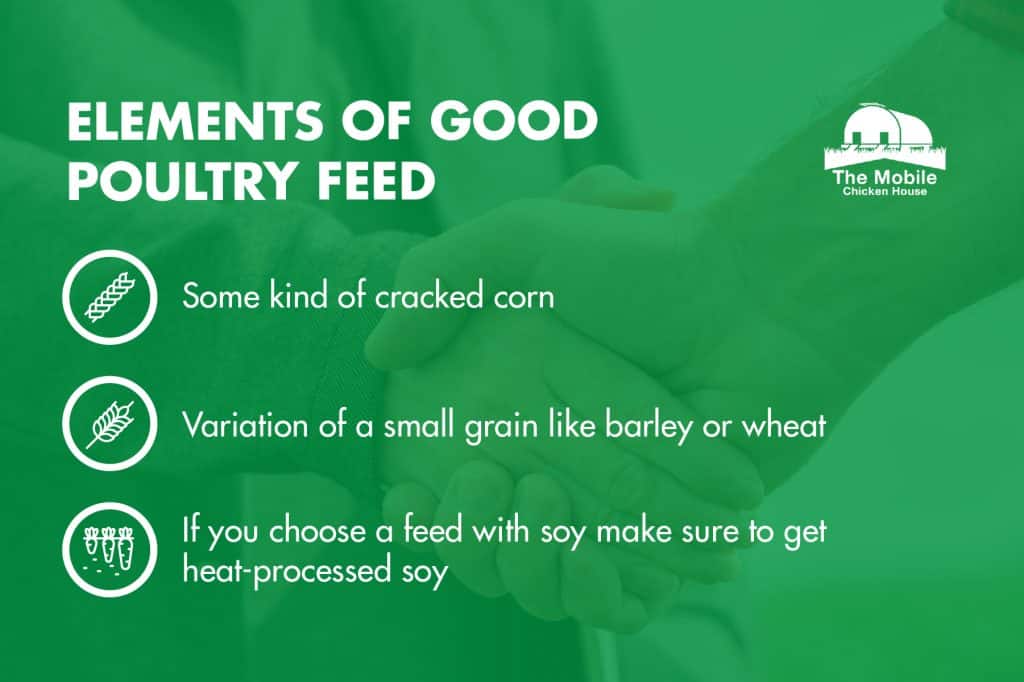
How To Minimize Feed and Other Expenses In Your Poultry Business
We told you that not wasting feed is important to maintaining a good profit in your poultry business. But how do you go about doing that?
Here are two general principles to live by:
- When your poultry eat something other than feed, they need less feed
- Poorly positioned feeders waste feed
1 - When your poultry eat something other than feed, they need less feed.
Do you remember those instances when you ate too big of a snack during the afternoon and lost your appetite for dinner?
It’s a simple principle at work: we can only eat a certain amount of food before we get stuffed and don't touch another morsel. Poultry also only need a certain amount of food and nutrition before they are full and happy.
However, while that snack you overindulged on cost money, poultry can eat natural foods that don’t cost you as a farmer or rancher any extra funds.
After all, most poultry are omnivores, and they eat just about anything that fits in their beaks. For example, chickens love to eat grass, weeds, insects, and vegetables.
In other words, if you allow your chickens to access the outdoors they can supply a lot of their diet directly from the land. In fact, the National Center for Appropriate Technology (NCAT) says that pastured poultry can obtain anywhere from 5 to 20% of their daily dietary requirement from forage.
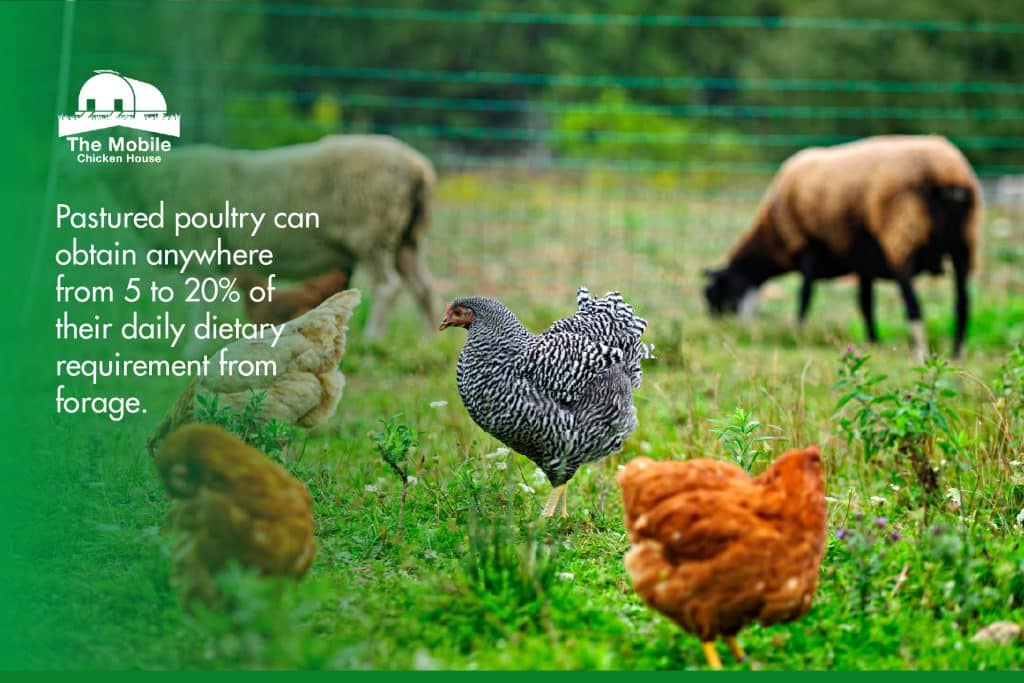
And, it doesn't cost you any money at all!
However, poultry eventually consume most of the natural food within an area if they are left there too long. That’s why it’s important to have a mobile coop that you can move from area to area.
As a massive side benefit, mobile pastured poultry also cut down on the amount of pests and rodents on your property, and as you move them from place to place their manure regenerates the soil.
2 - Poorly Positioned Feeders Waste Feed
Some of you are probably asking: “If poultry eat anything they can get in their beaks, why are my birds so picky?”
Many farmers observe their poultry picking through their food, flinging out the parts that they don’t want, and indulging in the pieces that they do want.
Unfortunately, this results in feed costs that are higher than necessary.
Thankfully, there’s a very simple solution to keeping your poultry from wasting feed.
All you have to do is adjust your feeder so the feeding tray is about as high as your bird’s back. A feeder at this height allows your poultry to comfortably eat, but keeps them from easily throwing feed outside the tray.
Of course, as your poultry grows, you’ll need to continue to adjust the feeder higher.
How You Can Reduce The Amount of Time Needed To Manage Your Flock
When you spend less time managing your flock you have more time for other important tasks, and your investment in your poultry business has a better return.
So how can you reduce the time you spend managing your flock?
The key lies in your poultry housing.
What do we mean? Let’s take a look.
1 - Use An Automatic Feed System
Most farmers that raise pastured poultry face a predicament: they want to raise their poultry on pasture because it seems like the best way to farm. However, raising poultry in this manner is time-consuming and doesn’t seem as profitable.
Thankfully, if you have a mobile chicken coop with the right features, the coop can actually help you save time and money.
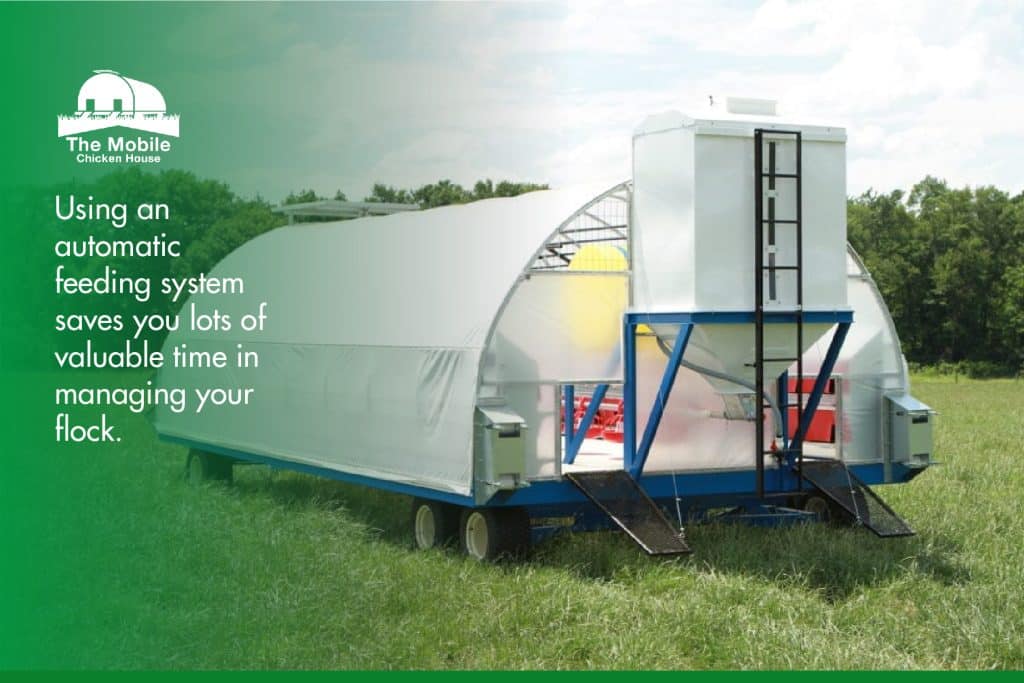
That’s why we highly recommend that your coop be equipped with a feed holding tank and an automatic feeding system.
Then, you don’t have to carry feed out to your birds every day. Rather, you can fill your feed bin once a week, set the automatic feeding system on a timer, and know your birds are getting the food they need, when they need it.
Over a year’s time, this feature alone saves you a ton of time.
2 - Use Automatic Lights
The amount of daylight hours affects a chicken’s reproductive cycle. Hens will begin laying when the amount of daylight reaches 14 hours per day during early spring. Maximum egg laying will occur when the day length reaches 16 hours per day.
Poultry owners can manipulate the egg-laying cycle to increase egg-laying in their flocks by providing artificial lighting in coops.
Supplemental lighting should be low-intensity, just bright enough to be able to read a newspaper at bird level, and applied in the morning hours so that birds naturally roost.
Most poultry owners aren’t excited about the prospects of getting up each morning to adjust the lighting in their coops—especially if they are using mobile coops.
However, if you put your lights on an automatic timer you can optimize the amount of eggs your poultry lay without spending any time doing it!
3 - Find A Way to Gather Eggs Quickly
If your poultry business includes egg layers, you know how time-consuming the process of gathering eggs can be. Checking each nesting box is tedious, especially when you have hundreds of birds.
If you could just find a way to gather eggs quickly, you could save yourself a lot of time and money.
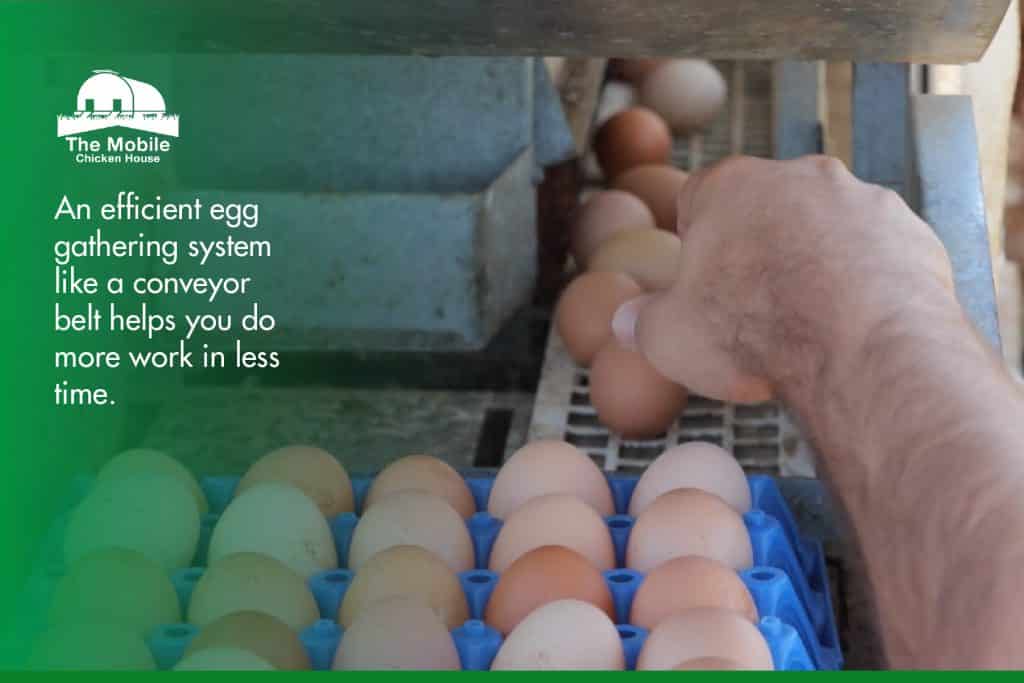
Thankfully, with a coop like the one from The Mobile Chicken House, you can do just that. Our house is designed to roll the eggs gently onto a conveyor belt after they are laid. Then, a simple turn on a handle brings the eggs right to you. You don’t have to take a step!
As an added bonus, eggs like this also tend to be much cleaner than eggs that have spent hours in a nesting box. This cuts down on the amount of time needed to clean your eggs before you sell them.
4 - Keep Costs for Powering House Low
Suppose you get a poultry coop that is mobile, has automatic feeding and lighting systems, and has an easy way to gather eggs.
Won’t it take money to pay for the power to run those features?
If gas, electricity, or a similar power source was used then it would. And that’s exactly why we recommend getting a house that runs from solar energy!
Don’t worry about a stretch of cloudy days either. The coops from The Mobile Chicken House come equipped with a battery backup for when you need it.
This is just a short list for getting you started on running an efficient poultry business. However, the most important factor in keeping your labor costs low is choosing the right housing.
Finding The Right Marketing and Sales Channels For Your Poultry Business
At the end of the day, you have to be able to sell your poultry products for a decent price, or your best efforts at remaining profitable are all for nothing.
With that in mind, here are a few tips for marketing your poultry products.
1 - Do Your Research
The first tip is simple. It’s not a good idea to raise any kind of poultry until you have surveyed and researched the market and know what people want.
If broilers are a hot commodity in your geographic area, go that direction. If there is a need for healthy, pasture-raised eggs, consider that instead. And, as hard as it is, be willing to acknowledge that poultry may not be a viable business option for you if there seems to be no market for them.
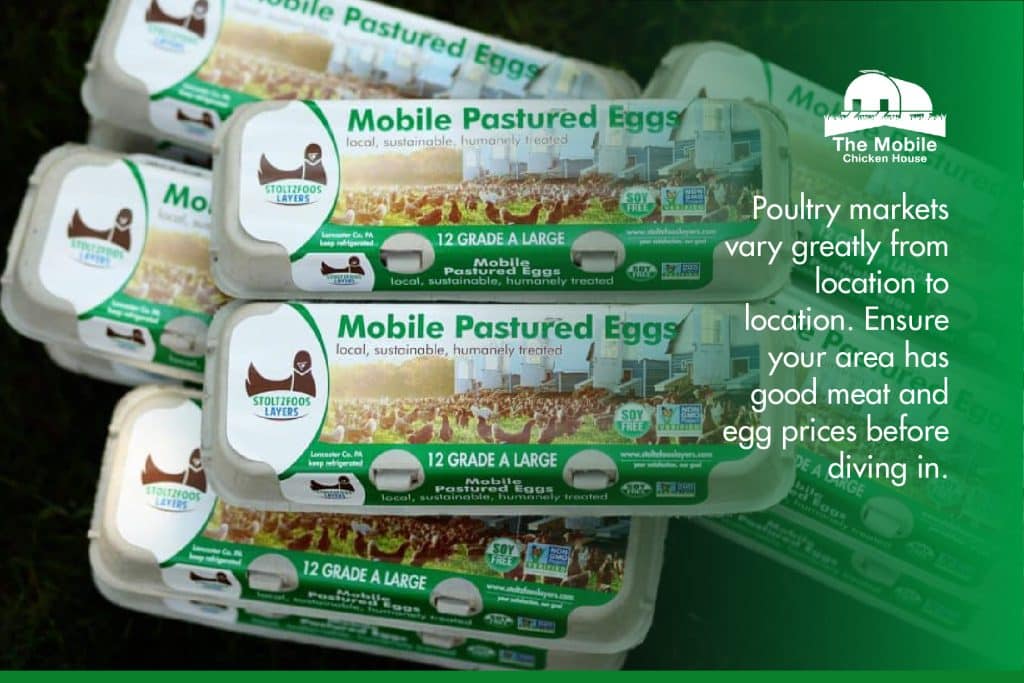
2 - Have sales outlets in strategic areas
Poultry products simply sell better in some places than others. For example, a $6 dozen of eggs won’t be very popular in Wal-Mart, but it may sell very well at a farmers’ market.
Make sure you identify the best places to sell your products and then consistently show up there so you begin to build brand recognition.
3 - Avoid wholefood and big names when you are starting
We want to make it very clear: getting started in selling your poultry products can be difficult - that’s why we’re writing this!
A common mistake many people make is going straight to wholefoods or big name markets and brands. While there is potential earnings in those places, they are dominated by bigger, established poultry businesses.
For a startup, the cost to acquire a license to sell at wholefoods plus insurances, certifications, and more is often not worth it. You’re better off making relationships with local vendors and consistently pursuing those avenues.
4 - Partner with Restaurants, Eateries, and Hotels
Restaurants, eateries and hotels are in constant need of fresh eggs and processed chickens. They would be more than happy to partner with you and would be willing to buy your eggs and chickens at a wholesale price. This is a great way to sell your chickens and eggs without much effort.
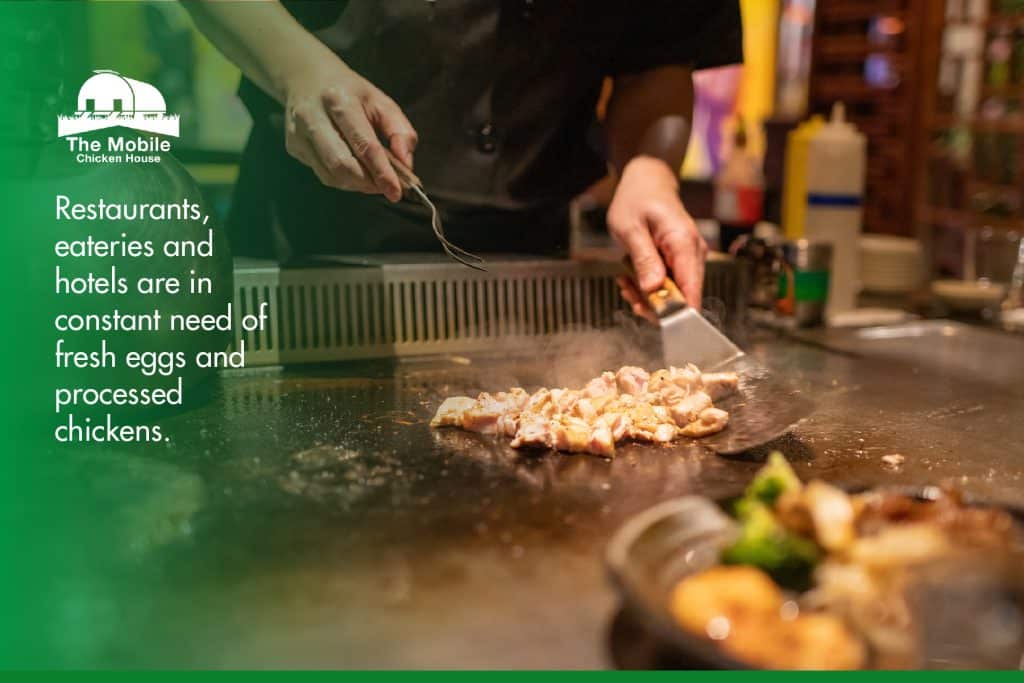
The key is to pursue the right opportunities. Are there restaurants or eateries in your area that are focused on serving local, healthy foods? Those are the places to pursue.
Again, most big name, high production restaurants are not interested in high-quality, locally based food products so it is likely not worth your time to pursue those sales channels.
5 - Build Local Relationships
Perhaps you are starting to sense a bit of a theme here. For those starting out in poultry farming connections with local vendors is your best option to building a profitable business.
Take the time to show up at stores, markets, restaurants, and any other possible vendor in your area. Bring a sample of your product and take time to build a strong relationship with them.
This builds your reputation and brand locally and is a good way to get started in the poultry business.
6 - Avoid Overproduction
It’s tempting to produce as many poultry products as you possibly can. However, most poultry products don’t last long, and if you overproduce that’s wasted money down the drain.
Keep careful track of how much capacity your current marketing and sales avenues offer to you, and don’t exceed that in production until you have locked in more demand for your products.
7 - Join Buy-Back Programs
Some chicken farmers participate in chicken buy-back programs. This is where a company or chicken meat processor agrees to buy back your chickens once they reach a certain age. This can be a helpful way to reduce the number of chickens that you have to dispose of at the end of their lifespan.
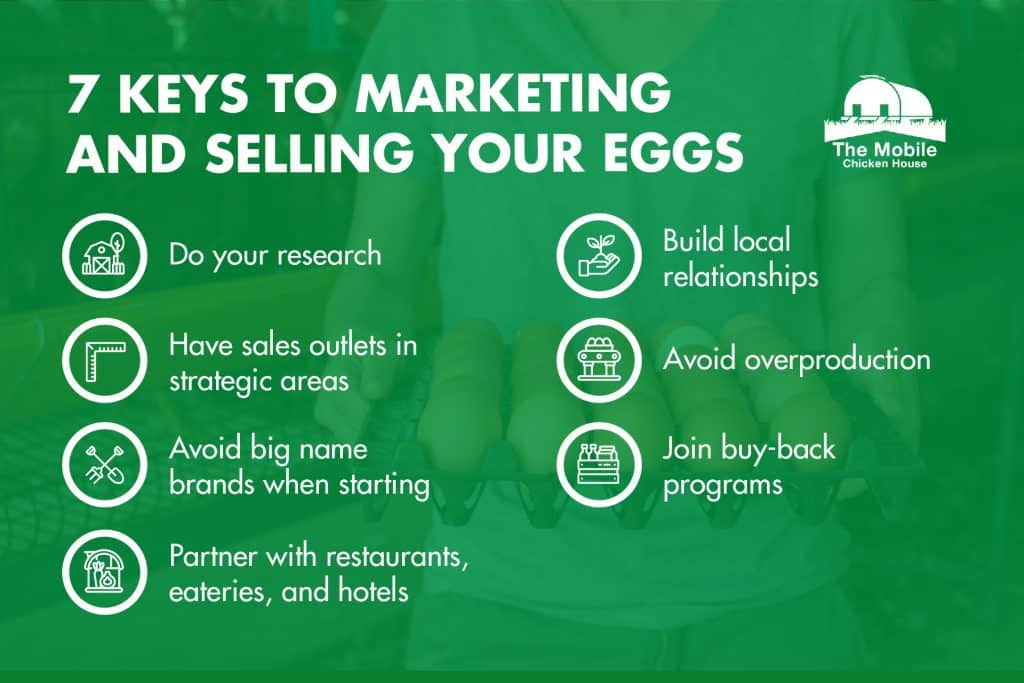
Conclusion
Raising poultry on pasture can definitely be a profitable business if you stick to the key principles.
In this article we learned that those key principles are:
- A healthy flock
- Reduced feed and expenses
- Minimizing labor
- Optimizing sales and marketing channels
Now, go put those principles into practice using the tips we offered!
If you are interested in raising broilers or egg layers in a mobile chicken house, let The Mobile Chicken House team know. We would love to help you get started!
We offer mobile coops for broilers as well as multiple models of mobile chicken houses for egg layers.
We also offer chicken house financing, and if you want to explore the soundness of your investment, check out our profit calculator.
Contact us today. We look forward to hearing from you!


